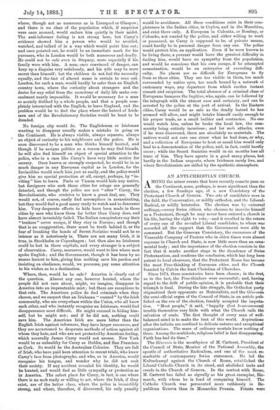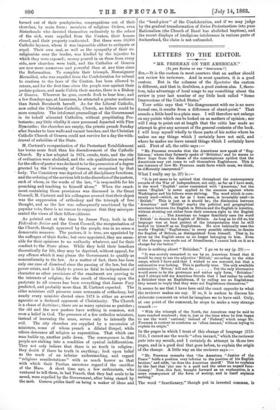AN ANTI-CHRISTIAN CHURCH.
AMONG the minor events that have recently come to pass on the Continent, none, perhaps, is more significant than the election, a few Sundays ago, of a new Consistory of the Protestant Church of Geneva. Two sets of candidates were in the field, the Conservative, or mildly orthodox, and the Liberal- Radical, or wildly heterodox. The election was by universal suffrage,—every Swiss citizen who chooses to inscribe himself as a Protestant, though he may never have entered a church in his life, having the right to vote,—and it resulted in the return of every one of the so-called Liberal candidates, to whom was accorded all the support that the Government were able to command. But the Genevan Consistory, the successors of the Venerable Company of Pastors who in olden times were almost supreme in Church and State, is now little more than an orna- mental body ; and the importance of the election consists in the fact that it marks another stage in the decadence of Swiss Protestantism, and confirms the conclusion, which has long been patent to local observers, that the Protestant Rome has become the most Free-thinking of European cities, and the Church founded by Calvin the least Christian of Churches.
Since 1874, three consistories have been chosen ; in the first, as in the last, the Free-thinkers were successful ; and, having regard to the drift of public opinion, it is probable that their triumph is final. During the late struggle, the Orthodox party stigmatised their opponents as Materialists, and the Ognevoia the semi-official organ of the Council of State, in an article pub- lished on the eve of the election, frankly accepted the impute,- tion. " Most people," it said, "happily (fort heureusemenfl► trouble themselves very little with what the Church calls the salvation of souls. The first thought of every man of well- balanced mind is to make the best of this world. Aspirations after the infinite are confined to delicate natures and exceptional organisations. The mass of ordinary mortals know nothing of these. Among the multitude, religious belief is fast disappearing. Faith has had its time."
The Geneoois is the mouthpiece of M. Carteret, President of the Council of State, Member of the National Assembly, the apostle of authoritative Radicalism, and one of the most re- markable of contemporary Swiss statesmen. He led the Kulturkampf against the Church of Rome, established the Liberal Catholic Church in its stead, and abolished tests and creeds in the Church of Geneva.. In the contest with Rome, M. Carteret has failed as signally as his great exemplar, Bis- marck, with whom he is fond of comparing himself. The Catholic Church was persecuted more ruthlessly in Re- publican Geneva than in Monarchic Prussia. Priests were
turned out of their presbyteries, congregations out of their churches, by main force ; members of religious Orders, even Sisterhoods who devoted themselves exclusively to the solace of the sick, were expelled from the Canton, their houses closed, and their property confiscated. But there were 30,000 Catholic laymen, whom it was impossible either to extirpate or expel. Their own zeal, as well as the sympathy of their co- religionists over the border, was kindled by the injustice to which they were exposed ; money poured in on them from every side, new churches were built, and the Catholics of Geneva are now more numerous and powerful than at any time since the Reformation. To complete their triumph, Monseigneur Mormillod, who was expelled from the Confederation for refusal to conform to the laws of the Canton, has been allowed to return, and for the first time since the people rose against their prelate-princes, and made Calvin their master, there is a Bishop of Geneva. Wherever he goes, crowds flock to hear him ; and a few Sundays ago, at Lausanne, he attracted a greater audience than Sarah Bernhardt herself. As for the Liberal Catholic, now called the Christian Catholic, Church, no failure could be more complete. The intolerant proceedings of the Government in its behalf alienated Catholics, without propitiating Pro- testants ; any little vitality it once possessed departed with Pere Hyacinthe ; the churches are empty, the priests preach Sunday after Sunday to bare walls and vacant benches, and the Christian Catholic Church of Geneva could not survive for a day the with- drawal of subsidies of the State.
M. Carteret's reorganisation of the Protestant Establishment has borne more fruit than his disendowment of the Catholic Church. By a law adopted in 1874, creeds, tests, and the rite of ordination were abolished, and the sole qualification required for the office of pastor was declared to be the possession of a degree granted by the University of Geneva, or recognised by that body. The Consistory was deprived of all disciplinary functions, and the ordering of the services left to the discretion of the pastors, each of whom, in the words of the law, "is responsible for his preaching and teaching to himself alone." When the enact- ment containing those provisions was discussed in the Great Council, M. Carteret and his colleagues avowed that their object was the suppression of orthodoxy and the triumph of free thought, and as the law was subsequently sanctioned by the popular vote, there is no reason to suppose that they misrepre- sented the views of their fellow-citizens.
As pointed out at the time by James Fazy, both in the Pidgraliste Suisse and the Great Council, the reorganisation of the Church, though approved by the people, was in no sense a democratic measure. The pastors, it is true, are appointed by the suffrages of their flocks ; but once appointed, they are amen- able for their opinions to no authority whatever, and for their conduct to the State alone. While they hold their benefices theoretically for life, they may be deprived, without appeal, for any offence which it may please the Government to qualify as nonconformity to the law. As a matter of fact, there has been only one case of dismissal since the passing of the law, but the power exists, and is likely to prove as fatal to independence of character as other provisions of the enactment are proving to the interests of religion ; for the result of throwing open the pastorate to all comers has been everything that James Fazy predicted, and probably more than M. Carteret expected. The older ministers still preserve some remnants of orthodoxy, but nearly every minister elected since 1874 is either an avowed agnostic or a declared opponent of Christianity. The Church is a chaos of doctrines ; there are as many opinions as parishes ; the old and the new pastors have nothing in common, not even a belief in God. The presence of a few orthodox ministers, instead of leavening the mass, serves only to intensify the evil. The city churches are supplied by a succession of ministers, some of whom preach a diluted Gospel, while others denounce all religion as superstition. That which one man builds up, another pulls down. The consequence is, that people are sinking into a condition of cynical indifferentism. .They not only believe that there is no truth in religion ; they doubt if there be truth in anything ; look upon belief as the mark of an inferior understanding, and regard "religious manifestations" with as much horror as that with which their Puritan ancestors regard:A the sacrifice of the Mass. A short time ago, a few enthusiasts, who ventured to tell them, in bad French, that they had souls to be saved, were expelled by the Government, after being stoned by the mob. Geneva prides itself on being a maker of ideas and the "head-piece" of the Confederation, and if we may judge by the gradual transformation of Swiss Protestantism into pure Rationalism (the Church of Basel has abolished baptism), and the recent displays of irreligious intolerance in various parts of Switzerland, the claim is not unfounded.



































 Previous page
Previous page